#writers’ room
Text
Writing Workshop Week 1: Show & Tell
Hello, writers of tumblr! It’s @bettsfic again with this week’s generative workshop.
Today we’re doing what might be my favorite class activity: Show & Tell.
You might be thinking, do you teach kindergarten or something? No, I teach college. But my students are often weary, downtrodden 20 year olds who are more than happy to go back to basics. Tumblr—being a website of people who care deeply about things and share that passion with others—seems like a great place to host Show & Tell.
Speaking of basics, let’s first talk a bit about…
The Writing Identity
The goal of many writers is to become better at writing. While I think this is an admirable goal it’s also a complicated one, because good writing is entirely subjective. Everyone has their own definition of what good writing looks like based on their knowledge base, history, and personal tastes. And so I often encourage my students, before they begin their journey of becoming a better writer, to step back and ask themselves, “What does good writing look like to me?”
And that’s the thing: you can’t really become a better writer. You can become a more patient writer, with the ability to write and revise multiple drafts of a work. You can become a more ambitious writer, with the ability to write longer stories and deeper themes. You can become a more detailed writer, with the ability to render images and the small details of living that maybe other people don’t notice. Writing is a skill that requires practice, but it also requires joy. You have to enjoy the work more than you fear the potential for failure. And to enjoy the work, you need to honor yourself, your interests, and your ideals. In other words, to become a better writer, you have to become more you.
I remember when I first started writing, I frantically sought out writing advice. I clung to simple adages and rules: active verbs are stronger than passive verbs; remove words like “think” and “realize” and other indicators of your characters’ interior experiences; take out adjectives and adverbs. If you were to adhere to all this advice, your writing wouldn’t become stronger, it would become colder. You would write like Hemingway. There’s nothing wrong with Hemingway, but Hemingway already did Hemingway, and that means you’re free not to be Hemingway.
Don’t we read to feel closer to people, to experience that which we couldn’t otherwise experience? The beautiful thing about prose is that it’s the only medium that conveys consciousness, because language is the way we contain our thoughts, and writing them down offers others the chance to understand them. E.M. Forster in his book Aspects of the Novel says that the only difference between a character and a person is that a character’s secret inner life can be known, but a person’s can only be understood in observed behavior. Novels are stories of consciousness; biographies are stories of deeds.
In my early days as a writer, those inane adages of “good writing” began to weigh on me, and I found myself frequently opening a blank document and telling myself, “I’m just going to write something for fun, for me, and so I don’t have to follow any rules.” Every time, that lawless thing I wrote would become better than anything I’d written when I followed the rules. And in this case, “better” means I was proud of it; in writing as close to myself as I could, I was able to help my technical skill reach the level of my personal taste.
Good writing advice doesn’t spout shallow adages of what should be, it tells you all the things that could be; it opens your mind to possibilities and techniques. “Should” restrains creativity; the entire point of writing is to be creative. To be creative means to make something that has never existed before. And so one of the first things I tell my students is: You already know everything you need to know about your own writing. You already have good and important stories in you. You just have to sit down and write them.
“Show, Don’t Tell”
One such adage that still really gets to me is “show, don’t tell,” which a lot of writers believe. Many people take it to mean that you should describe the exterior circumstances of your narrator in order to allow the reader to interpret meaning. Instead of describing how your narrator feels, these people would rather have you describe their facial expression. But if you’re so interested in rendering the exterior rather than the interior, you’re better off becoming a director.
Others take it less literally: you show your story instead of tell your story, which, sure, is a valid personal belief for your own work but it’s ambiguous and impractical, and also denies the nature of people to tell stories. Fairy tales and fables are stories that are told. Telling stories came long before showing them.
In some ways, “show, don’t tell,” can be useful. If you spend a thousand words of character A lovingly and carefully describing every detail of character B, you don’t then need to say something like, “She was pining for him,” because you’ve allowed your description to do that work for you. So no, you don’t need to say it, but maybe you want to. Maybe you want to make it inarguable that character A is pining for character B; you don’t want a reader to say, “I think she’s paying that much attention because she wants to kill him and she’s looking for his weak points.”
And so that’s what it comes down to—choice. Ultimately, writing is about making decisions, and those decisions are stronger when you understand all your options.
Behind the adage is a more difficult truth to swallow: prose is both infinite in its potential and also frustratingly limited, because you have no control over your audience. You can lovingly describe every snowflake that falls in a blizzard, and your reader will be taking their own meaning from it—for people who can mentally visualize things, it’s the images their mind conjures; for those who can’t, it’s a mass of facts. And there are also those who are sleepy and missing details, or who are skimming to get to the bits they’re most interested in, or who accidentally dropped their book in the bath and now the bottom half of every page is warped and unreadable.
Or you can say, “It snowed.”
No matter what your beliefs are on “show, don’t tell,” the truth is that it’s a false dichotomy. The very nature of prose is to navigate this divide. Some stories call for more showing, for example when your narrator is at a distance, when we don’t have much access to their thoughts or feelings. Other stories will ask you to tell, especially if we’re deep in your narrator’s head and they’re giving us everything. Showing lends itself to setting, imagery, and plot. Telling lends itself to character, voice, and style. One is not inherently better than the other, in the same way that a screwdriver isn’t better than a hammer—the tool you use depends on the task at hand.
Any time you encounter a trite rule in writing, it’s usually pointing to something much greater and more fun to think about. In this case, showing and telling are two integral tools in meaning-making. For this week’s activity, we’re going to use both show and tell to make meaning.
Prompt time!
In Donald Barthelme's essay “Not-Knowing,” he calls objects magical. “What is magical about the object is that it at once invites and resists interpretation. Its artistic worth is measurable by the degree to which it remains, after interpretation, vital.”
So what does that mean? Although this essay is a hot mess (lovingly), part of its intended work is to be a mess. In fact Barthelme describes the mess of his desk and allows it to define him. It’s covered in coffee cups, cigarette ash, unpaid bills, and unwritten novels. In reality, those objects are just objects, but when rendered in prose, they give us an impression of this particular world and the character within it. The writer renders; the reader interprets. The things we own, that mean something to us, are also things that can define us. Who is the person who carries a leather wallet embossed with their initials, with the inside holding credit cards and a stack of neat bills? Who is the person who carries a canvas wallet with a faded Punisher logo on it, attached to a chain, and the only thing inside it is a Subway rewards card?
Objects are important. Especially in this world we live in where so many things have become virtual, tangibility will always be integral to us. We are a species that reaches out and touches. We like to hold things in our hands. We love things which cannot love us back.
For this week’s prompt fill, I want you to find a magical object for Show & Tell. Ideally, it’s something with a long personal history that’s important to you. Maybe it’s the object you would save in the event of a fire, or maybe it’s something you lost long ago.
First, I’d like you to show us the object by describing it. Then, tell us the story of it.
You can write about how you acquired it and the memories it conjures. Allow yourself to link and associate memories and feelings. Don’t box yourself in too much—just see where it takes you.
But you can also put a spin on it. Here are some ways you can do that:
If you want to try fiction, you can write the same story about your favorite character’s beloved object, or you could completely make up an object and its history.
If you want to try something experimental, you can write a story from the perspective of the object, and maybe its beloved thing is you.
If you want to try poetry, write a poem of your object. This is a separate lesson, but T.S. Eliot’s concept of an objective correlative may be illuminating to consider.
The purpose of this activity is to dig through your memories and/or observations, connect them, and use something external to conjure meaning from them. You begin with what your object is and it will eventually lead you to what it means.

Questions? Ask ‘em here before EOD Tuesday so @bettsfic can answer them on Wednesday. And remember to tag your work #tumblr writing workshop with betts if you want her to read your work and possibly feature it on Friday!
And, for those just joining us: @bettsfic is running a writing workshop on @books this month. Want to know more? Start here.
#tumblr writing workshop with betts#writers’ room#writeblr#writing advice#show and tell#long post#long text post
256 notes
·
View notes
Text
he would not fucking say that moments in fan interpretations is frustrating but at least you can ignore it. when the source itself makes him fucking say that that's when you're fucked.
32K notes
·
View notes
Text

oh so we’re at this part of the movie huh
11K notes
·
View notes
Text
annabeth saying to percy after the ares fight “and you thought you were just a kid” because percy is finally coming into his own as a demigod and realizing his full potential and power, and then later percy saying to annabeth “just be a kid” because he helped annabeth let go of her blind belief in the gods and her soldier mentality and helped her connect to her mortality… in this essay i will
#IM SOBBING MY EYES OUT#WRITERS ROOM COOKED.#pjo tv#pjotv#pjo tv spoilers#percy jackson#pjo#percabeth#percy jackson and the olympians#percy jackon and the olympians#ruch rambles
2K notes
·
View notes
Text

During this peculiar September heatwave we are having, I made the pilgrimage to Virginia and Leonard Woolf's house in Sussex.
#journal#virginia woolf#leonard woolf#monks house#sussex#litblr#literature#booklr#bookblr#modernism#writers rooms#writing
4K notes
·
View notes
Text


Just a fleeting thought :) Credit for this idea goes to my wife @xoleahbeanxo
#Helluva Boss#blitzø#blitzo#BlitzFizz#fizzarolli#my art#actually I think my daughter came up with the idea and my wife continued it#I have a writer's room everywhere I go#Im so grateful to my creative family
2K notes
·
View notes
Text
funniest thing about house md is that house has like every flavor of trauma responses and is cut deep by shit so much in his life that he in fact creates new ones. except over getting shot. like someone literallly walked in and shot him twice trying to kill him. and then he never brings it up again after it happens. not like he’s burying it and repressing. like it straight up did not phase him and he went right back to ruining patients lives afterwards. king.
#house md#a hack filled writers room can create such funny storylines#like he wears kutners secret santa watch until the series finale#like that left an impact#but not like getting shot with a gun
9K notes
·
View notes
Text
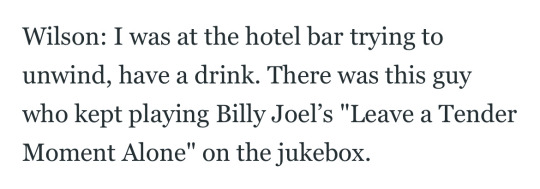
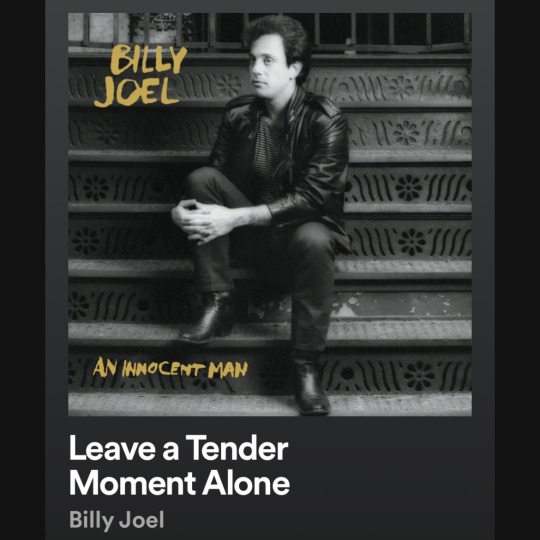
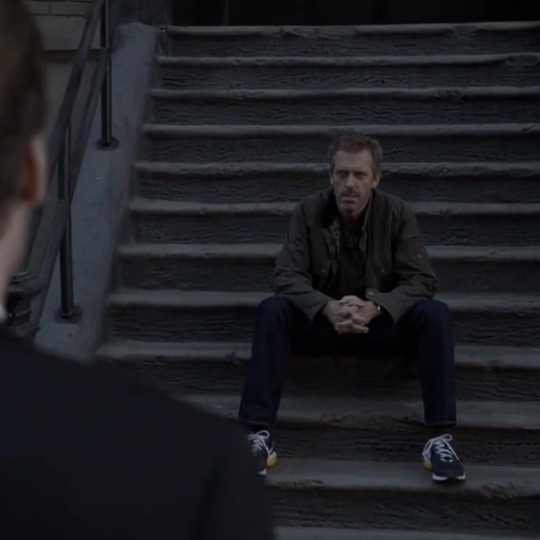
every birthmarks everybody dies parallel takes twenty years off my life
#this can’t have been intentional but then like. the boring thing#they absolutely rewatched birthmarks before writing that ending#so maybe it was#wish i could’ve gone into that writers room and strangled them all to death with my bare hands#also someone must have pointed this out already but i don’t think i’ve seen it if they have i think i would’ve gone insane then and there#house md#hilson#+
1K notes
·
View notes
Text
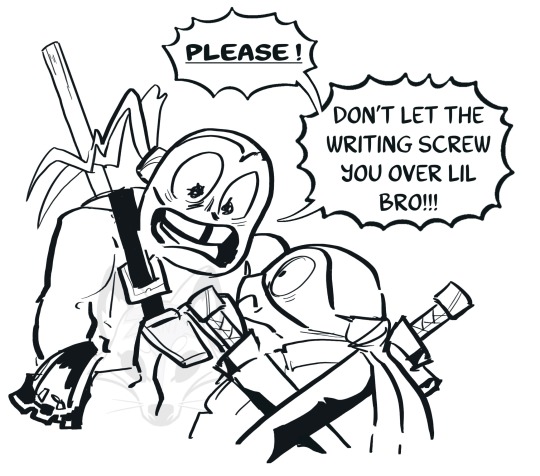

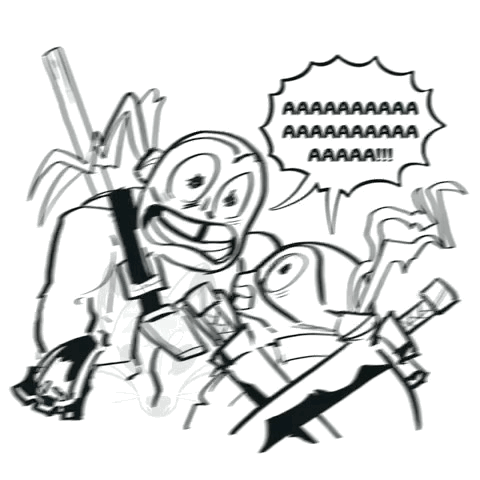
12 Donnie has some words for MM Leo if he’s gonna survive the writing room
#after thought to an after thought that I had to draw#the prophet-he speaks and you are not gonna like what he has to say#ah yes: the dangers of relationships in the tmnt shows#well if you could even consider the majority of ‘relationships’ real#there’s goods ones (canon and non-canon) don’t get me wrong#Donnie just needs to protect his lil bro from falling to the same wounds of the writers room#mm leo#12 donnie#tmnt 2012 donnie#tmnt donnie#tmnt leo#tmnt leonardo#tmnt donnatello#tmnt mutant mayhem#tmnt mm#tmnt 2012#tmnt 2k12#tmnt#tmnt fanart#my art#teenage mutant ninja turtles#tmnt doodles
2K notes
·
View notes
Text
More regarding mini rooms

(link to tweet) (link to blog post)
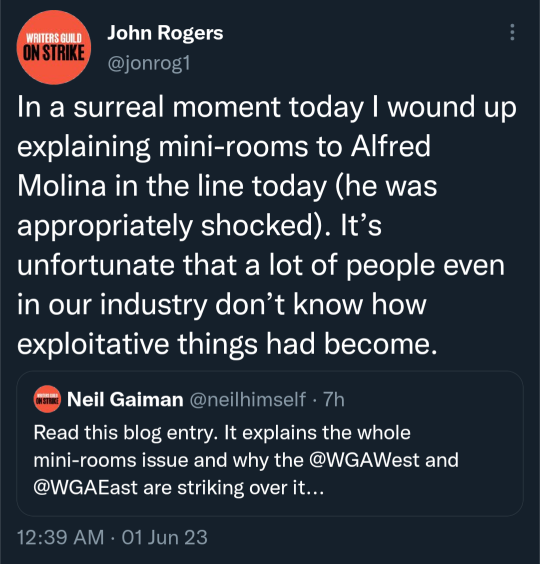
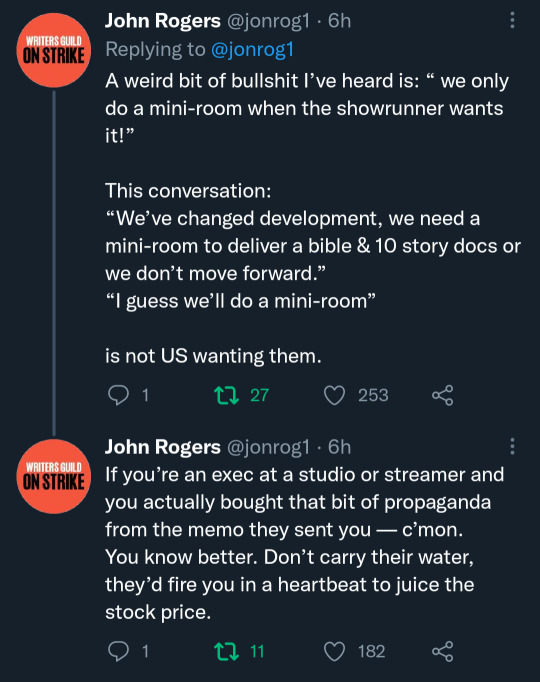
(link to thread)
#mini rooms#john rogers#neil gaiman#alfred molina#wga strike#wga strong#wga#writers guild of america
4K notes
·
View notes
Text
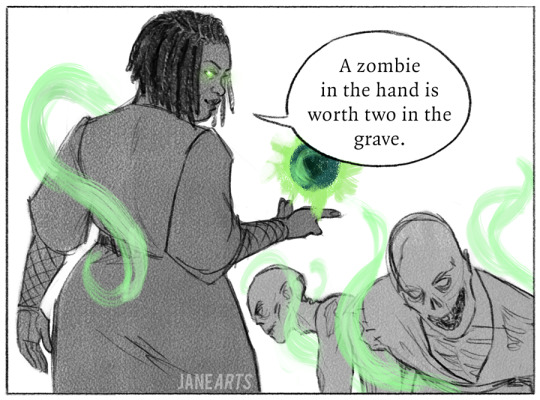
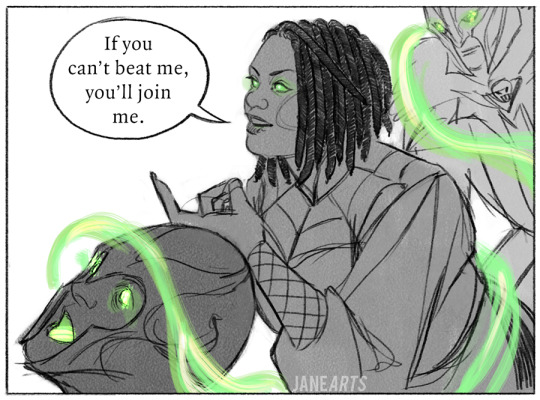
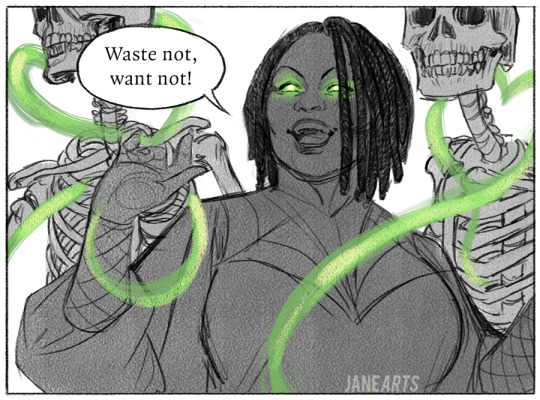
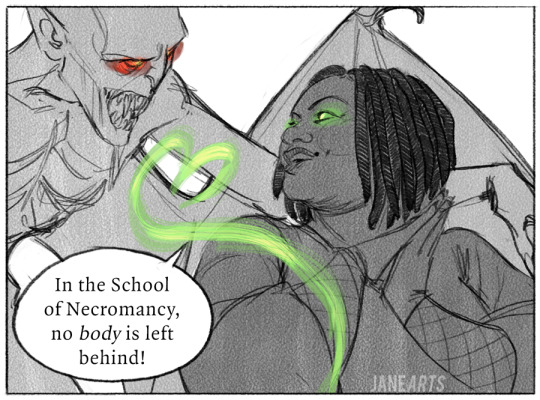
I originally created Roisia in Divinity: Original Sin, which had some phenomenal (and/or phenomenally corny) combat barks, so I came up with some more for her to shout in Baldur's Gate 3 to keep with tradition. UwU
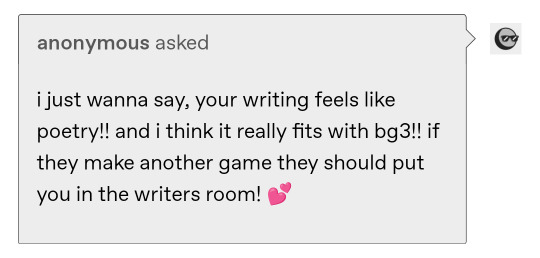
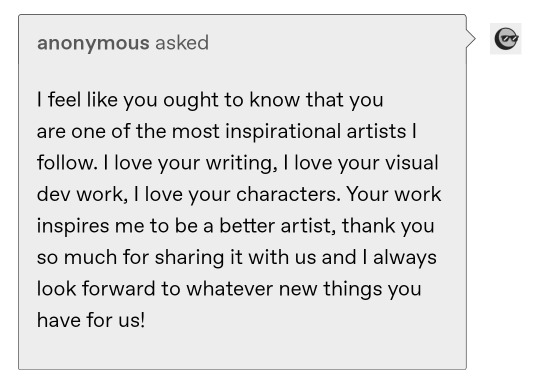
And thank you so much for these lil notes! ;o; They cheered me up.
#Baldur's Gate 3#BG3#BG3 Roisia#also just#regular DOS#Roisia#you can't put me in the writers room i would be like 'weeeeelll can we make *points* that one romanceable?' on an endless loop#fired within the first half hour of opening my mouth
2K notes
·
View notes
Text
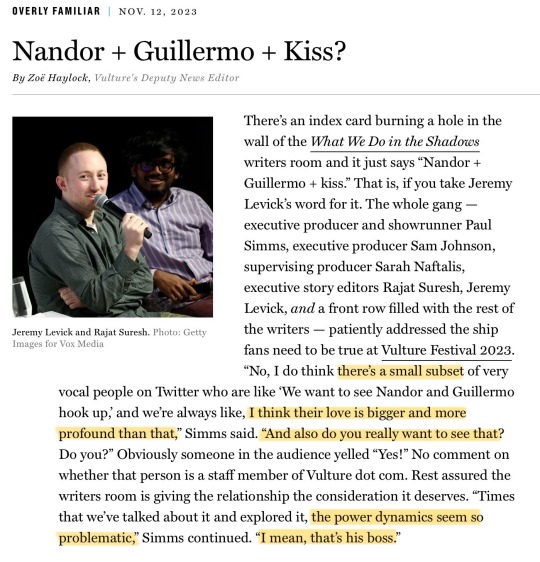
oh ok so its the usual no-homo bullshit you always hear, good to know.
#wwdits#what we do in the shadows#guillermo de la cruz#nandor the relentless#nandermo#look im a reasonable guy#i dont get worked up easily and ive been around writers rooms and understand the pressures of writing a big show like wwdits#hell i even liked season 4#but this has got to be one of the most offensive bs ive read that wasnt from 2015#‘its only a small (but vocal) amount of people that actually want to see them together’#‘their love isnt ~s*xual~ they dont need to kiss its more ~profound~ than that’#‘you don’t REALLY want to see them together! (thats gross!)’#also ‘the power dynamic is ~problematic~’??? are you kidding me???#jfc its like someone literally got this out of the queerbating handbook from 2010#and like yeah i know wwdits isnt queerbating but its queerness feels more performative when it treats an actual central relationship#like its a gross kinkything only a few freaks on the internet want#instead of a legitimate plausible story that deserves exploration#nandermo should be a triumph - a victory for the characters and something the writers should be pleased with writing#not…this.#like it’s some problem pressured reluctantly upon them that needs to be carefully defused#this has left a bad taste in my mouth
1K notes
·
View notes
Text
Wyll calling his lover his 'star'. Astarion's spawn ending being him adventuring and performing heroics of his own choice. Wyll naming his adopted daughter Lily. The flower Astarion's lover puts on his grave being a lily. Monster hunter turned monster and monster turned hunter. Can nobody hear me
#Clawing at the walls who was in the writer's room making all these decisions#Technically every relationship both exists and doesn't exist simultaneously (schrodinger's relationships) depending on how you play#But the narrative significance of wyllstarion being canon will always drive me crazy#Don't even get me started on shadowzel too my GOODNESS#wyllstarion#bloodpact#Wyll Ravengard#astarion ancunin#Astarion#Bg3 Wyll#bg3 astarion#Bg3#baldurs gate 3#baldur's gate 3
516 notes
·
View notes
Text
built some joel statues because he likes to miniaturize things. no other reason
#sculptor etho muse joel au where etho struggles with his feeli-*i am forcibly ejected from the writers room*#etho#ethoslab#smallishbeans#joel smallishbeans#hermitcraft#boat boys
834 notes
·
View notes
Text
Here’s a very good explanation of “mini writers rooms” — one of the main sticking points for the WGA strike.
Source @notcapnamerica on Twitter 🤎
3K notes
·
View notes
Text









@perseephoneee.
#witchthewriter#blue whimsigoth#whimsical#aesthetic#moodboard#personal aesthetic#whimsigothic#whimsygoth#whimsigoth#whimsicore#whimsicore moodboard#whimsigoth aesthetic#whimsigoth fashion#whimsigoth room#whimsigoth decor#whimsigoth art#witchcore#witchy#blue moodboard#blue aesthetic#witch the writer's moodboards
410 notes
·
View notes